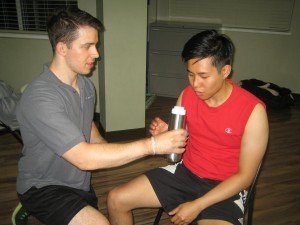Sore throat is one of the most common complaints, especially by children and teenagers. It is described as the itchiness or irritation of the throat and leads to difficulty swallowing. Sore throat is usually a symptom of an underlying infection that is primarily viral or bacterial in nature. Often, sore throats do not usually require medical attention, unless pus or exudates are present.
The throat, which is technically the pharynx, is a tube that can either deliver air to the trachea (windpipe) and larynx (voice box) or allow food to enter the esophagus. Sore throat is also referred to as pharyngitis.
Causes of Sore Throat
Sore throat is usually caused by viruses and bacteria, but it can also be caused by irritants and injuries. In approximately one third of all cases, the cause is undetermined.
Viral Infection
- Common cold (leading cause)
- Influenza
- Chickenpox
- Measles
- Mumps
- Laryngitis
- Mononucleosis
- Sexually transmitted diseases, such as HIV
Bacterial Infection
- Strep throat
- Tonsillitis
- Epiglottitis
- Uvulitis
- Adenoiditis
- Diphtheria
- Whooping cough
Irritants
- Allergies
- Gastroesophageal reflux disease (GERD)
- Chronic fatigue syndrome
- Cigarette smoking
- Dryness of the throat
Injuries
- Injury to the back of the throat
Risk Factors of Sore Throat
Sore throat can affect any of any age, but there are certain risk factors that increases a person’s likelihood of getting sore throat:
- Children
- Individuals with allergies
- Smokers
- Immunosuppressed individuals
Associated Symptoms of Sore Throat
The primary symptom of sore throat is pain the throat. Other associated symptoms include:
- Itchiness or irritation of the throat
- Difficulty swallowing food and liquids
- Pain that worsens upon swallowing
- Dryness of the throat
- Fever
- Swollen lymph nodes, especially in the neck
- White patches on the tonsils
- Voice hoarseness
- Cough
First Aid Management for Sore Throat
Sore throat does not usually lead to medical emergencies, in fact, they can be treated easily at home. The treatment will depend on the cause. For sore throat that is caused by a bacterial infection, it may slightly harder to treat and would require the use of antibiotics. Fortunately, for sore throat that is caused by other causes, there are plenty of treatments that can be done at home. Some of these include:

- Drink warm fluids to avoid irritating the throat further. One can try warm water, tea or soup.
- Eat only smooth foods to avoid further irritation.
- Gargle with salt in warm water for at least 30 seconds. Dissolve one teaspoon of salt in 240mL of warm water. Do this at least once every hour. This can reduce the pain and itchiness in the throat.
- If sore throat is caused by an irritant, avoid the irritant.
- One may use lozenges that contain benzocaine to relieve pain
- Take over the counter pain relievers, such as paracetamol and ibuprofen, which can also reduce the pain. Do not give aspirin to children.
Sore throat or pharyngitis is the itchiness of the throat (pharynx) that is commonly caused by a viral or bacterial infection.
https://www.youtube.com/watch?v=PyOVrev_tEk
